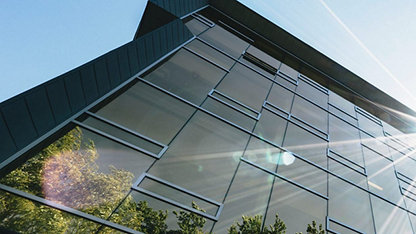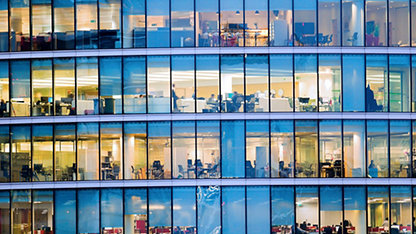As the need to engage with climate change and sustainable living becomes more and more urgent, the built-environment sector is seeking ways to support the transition towards net zero.
Firms will need to introduce new roles, with the competencies and skills to ensure responsible practices are underpinned by their values and thinking, and surveyors will have to follow new guidance and professional standards to meet the demand for a sustainable future.
Why the industry must support governments’ net-zero efforts
The WBEF Annual Sustainability Report 2021 highlighted the need for the construction sector to make a greater contribution towards achieving net zero. Almost two-thirds of survey respondents named minimising waste as a priority for the industry, yet only half suggested there had been an increase in demand for recycled and reused construction materials.
The COP26 summit held in Glasgow last November demonstrated that reducing emissions and making all industries more sustainable is a leading concern for many nations.
India updated its targets to achieve low-carbon power by 2030, committing to net zero – achieved by reducing carbon emissions – by 2060. Irish prime minister Michael Martin also set out a plan to reduce greenhouse gas emissions in his country, which included retrofitting 500,000 homes by 2030.
It is clear that, to help achieve these goals, organisations need to implement their own net-zero strategies. What will these involve?
Legislation reinforces need to source renewable energy
Buildings are changing and, as the construction sector evolves, more attention is being paid to sustainable energy sources. Changes to legislation are also affecting the choices organisations make about energy provision and encouraging them to take a more strategic approach to building operation that goes beyond cost-saving initiatives.
andlords are now required to meet by having a valid energy performance certificate (EPC) rated above band E. This applies to all existing and new tenancies as well as renewals, and there will be a higher penalty fee for non-compliance from 2025.
All organisations therefore need to address the energy efficiency of their properties. To do so, they may look at how they can adapt a building to comply with the new EPC requirements or optimise its performance.
With frameworks such as RICS International Building Operation Standard (IBOS) available to support the collection of data and measurement of performance, owners and occupiers can gain a clearer understanding of how to improve all kinds of building.
Organisations seek to repurpose rather than replace buildings
There is also a growing demand for greener construction methods and materials. Debate about the pros and cons of concrete, cement and steel have been ongoing, and the desire to repurpose and reuse buildings instead of reducing them to rubble is growing.
Instead of replacing existing buildings with new ones, organisations can look at how their current spaces can be optimised. For instance, CBRE UK Advisory Services provided a blueprint for the office of the future when it retrofitted its headquarters in London.
Following an extensive redevelopment programme, it created a workplace that focuses on hybrid working patterns, well-being, collaboration, and productivity. Some new features include:
- a 4,500 sq. ft extension, designed to be human-centred and support the well-being of 2,000 employees
- new amenities including wellness studios, a library, a tech bar, innovation and pitching spaces, dedicated visitor lounges, a two-storey retail facade, and facilities for new parents returning to work
- five floors of varied workspaces to enable hybrid and agile working practices
- in-house digital infrastructure to support a variety of smart features, including an integrated community app.
By evaluating the needs of the organisation and aligning these to the facilities already available, CBRE managed to retain its existing workplace while adapting it to suit these modern requirements.
“It has been a pleasure to collaborate with both CBRE and MoreySmith to provide an outstanding benchmark in office retrofit and sustainable design, transforming the 144,500 sq. ft commercial space for our tenants CBRE into a stunning office facility. [This offers] the highest level of service, amenity, and tech-enabled provision in an environmentally friendly framework.”
Nicholas Lazari, director of CBRE’s landlord Lazari Investments
Securing a net-zero future
As the impact of climate change is felt more clearly around the world, the transition towards carbon-neutrality and net zero becomes more urgent. For surveyors, this means considering not just the purpose of a building but the way it operates to fulfil that purpose.
In turn, organisations need to evaluate their energy efficiency and take action. They can do this through consistent data management and by reflecting on their organisational needs. Additionally, they will need to source eco-friendly alternatives to the materials that contribute to emissions.
More strategies to support the transition to net zero will be discussed at RICS’ online UK Building Surveying Conference 2022 in May. The event will also offer:
- an exchange of building surveying knowledge, experience, and leading professional insight
- live sessions and access to event recordings
- opportunities to network and interact














